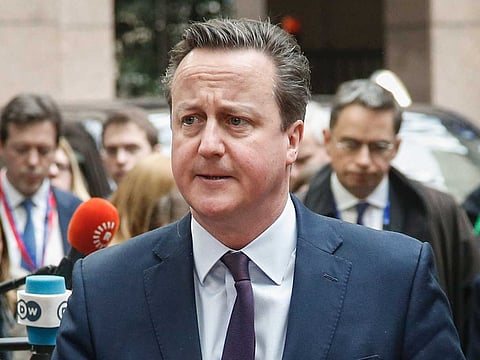Brexit is Cameron’s worst folly
June 23 will mark the British PM’s last throw of the dice foolishly chancing his nation’s economic health, security and relevance within the international community

Britain’s Prime Minister David Cameron is a gambler. At stake is the future of what used to be Great Britain, a major world power. He’s tempted fate by agreeing to a referendum on Scotland’s independence from the UK and now that he’s engaged in the biggest gamble of all, a referendum on whether Britain should exit the European Union (EU), he’s panicking big time. A ‘yes’ result is not only fraught with unknown consequences, it is likely to see him forced to resign.
He’s tried to sell his hard-won new deal with the EU, giving his country exceptional status on a number of issues, to the public, but according to polls, the majority isn’t buying it. A recent Telegraph survey found that 39 per cent of voters want to quit as opposed to 36 keen to stay. If that translates into votes on June 23 there will be no going back.
The question is whether such a crucial decision should be left to the electorate. Britons are known to be fiercely patriotic and independent and without considering the potential economic implications, many will make purely emotional choices. We Britons have never tapped into the European culture and many of my compatriots believe Europe has ripped off the UK and is responsible for an influx of job-robbers, forgetting that British citizens enjoy the same privileges.
The other day I called a friend in Wales who was indignant simply because the check-out girls in his local supermarket were talking together in Polish. He fears his homeland’s very identity is being polluted, unaware of his own double standards when he has spent most of his adult life in the Middle East and at one time owned an apartment in southern Spain. He wants out of the EU, but when I asked him whether he had studied the economic factors, he admitted he hadn’t.
More than 1.3 million Brits have relocated to a European country where many have opened businesses and bought homes. According to the Organisation for Economic Cooperation and Development there are more Britons living abroad than nationals of any other European state.
The Minister for Europe David Lidington has warned that an exit could put “everything we take for granted about access to the single market at risk, including “the right of British citizens to go and live in Spain or France”. That warning like so many others has been written off by the pro-Brexit newspapers as “scaremongering”. That may be so, but no one should bank on it when some European leaders threaten repercussions.
The ‘revenge’ factor cannot be discounted. Indeed, UK Foreign Secretary Philip Hammond predicts Britain will be punished. “They [EU member states] will not have an interest in demonstrating that we can succeed outside the EU,” he said, explaining that Europe is fearful of a precedent being set which could spark a contagion placing the EU project in jeopardy.
Hammond could be right. French President Francois Hollande has warned of “consequences” for Britain’s economy and immigration policy. France’s Minister for the Economy, Emmanuel Macron, told the Financial Times that should Britain leave, France would limit its access to the EU market and may contemplate ending border controls in Calais tasked with keeping out illegal migrants. Gunther Krichbaum, a prominent MP in Merkel’s party, is advocating the imposition of heavy trade tariffs on British exports if the divorce goes ahead.
Business leaders overwhelmingly want Britain to stay in. A recent survey by the Economist Intelligence Unit reveals that 79 per cent of managing directors, entrepreneurs and executive employees envisage a negative impact on investments, jobs and revenues. Others portend a loss of direct foreign investment to European capitals. Multinational companies might also take the door out heading to places offering greater access to the single market. Several major banks including Citicorp believe Britain’s GDP growth would suffer; others warn of a looming specter of recession.
Currency value
Moreover, the pound is plunging. Goldman Sachs warns the currency could lose 20 per cent of its value if Britain votes to leave. The Bank of England Governor, Mark Carney, is clearly worried. He’s indicated that an exit could “test the kindness of strangers” in a volatile global environment. European “strangers” may not be in any mood to be kind.
Besides the financial aspects of Brexit are very real concerns that Britain will lose geopolitical clout. On that, US President Barack Obama has weighed in urging Britons to vote to stay in. “Having the United Kingdom in the European Union gives us much greater confidence about the strength of the transatlantic union,” he said. The fact is that if the UK quits it will lose leverage to influence not only European but also global affairs.
In a world facing unprecedented security challenges requiring intelligence sharing and military cooperation, big is beautiful. A vote for isolation would be madness in my estimation. Should the day come when Brussels is no longer breathing down Britain’s neck, the euphoria is likely to wane in tandem with the diminishing contents of people’s pockets. June 23 will mark Cameron’s last throw of the dice foolishly chancing his nation’s economic health, security and relevance within the international community. Rien ne va plus!
Linda S. Heard is an award-winning British political columnist and guest television commentator with a focus on the Middle East



